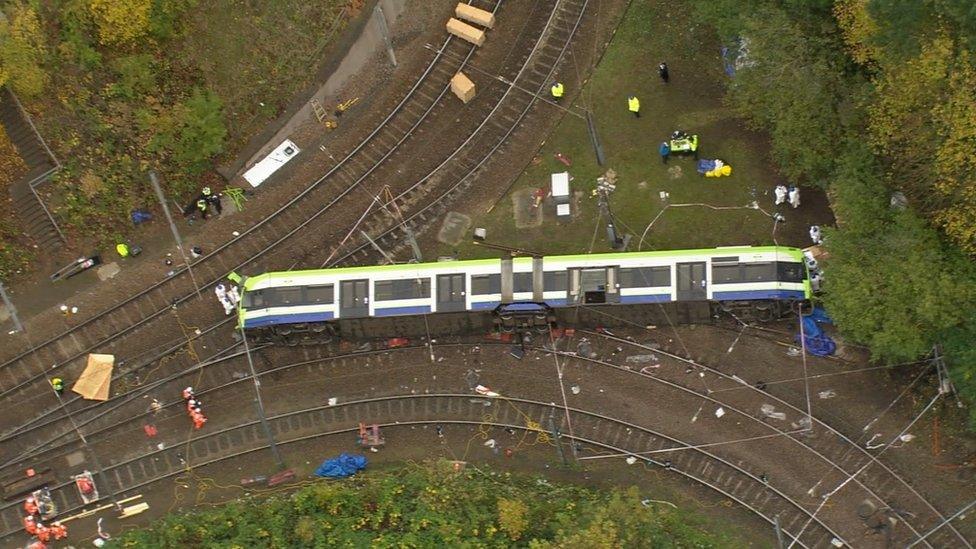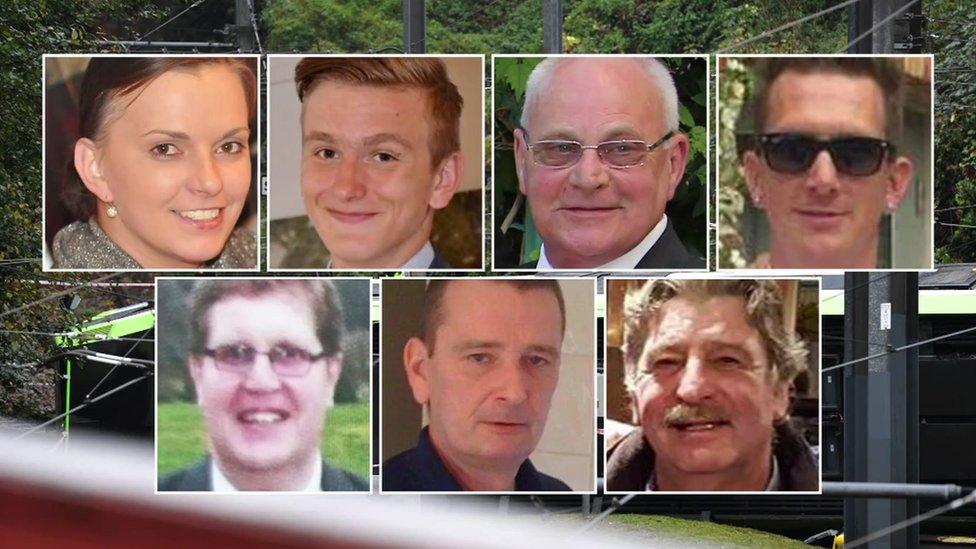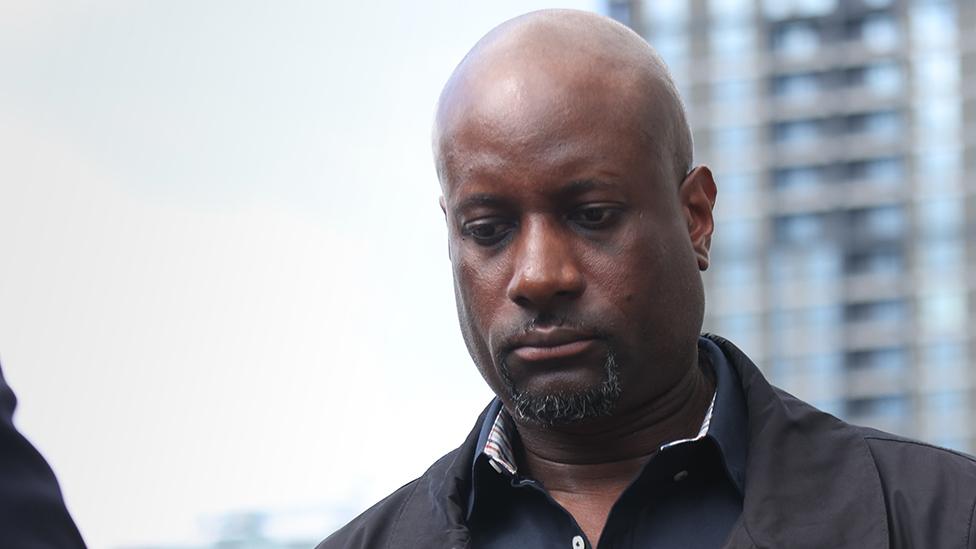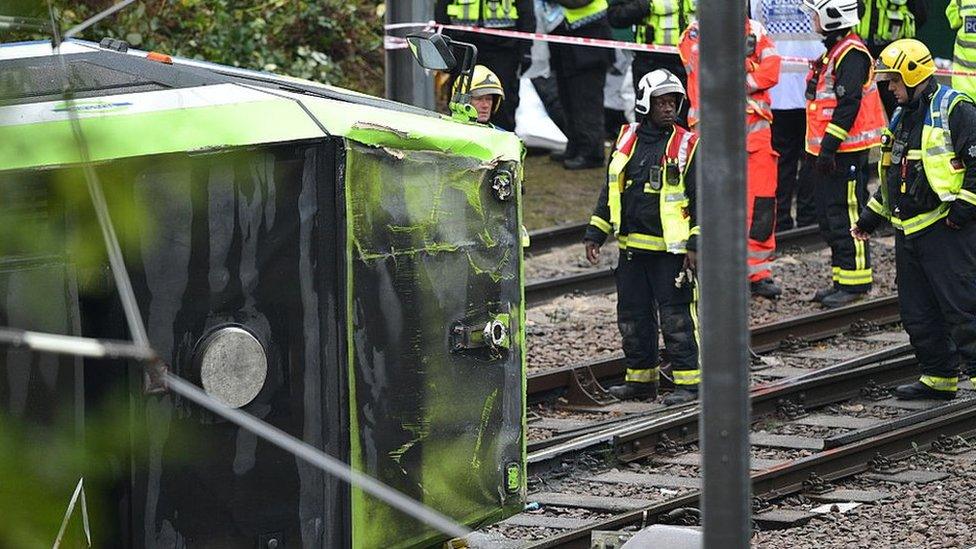Croydon tram crash: Operators fined £14m after seven people killed
- Published

The tram was travelling at three times the speed limit when it toppled over on a sharp bend near the Sandilands stop
Tram operators have been fined a total of £14m at the Old Bailey after seven people were killed when a tram crashed in Croydon, south London.
Transport for London (TfL) was fined £10m and Tram Operations Limited (TOL) was fined £4m for failing in their health and safety duties.
The tram, which was carrying 69 people, toppled over on a sharp bend on the morning of 9 November 2016.
Driver Alfred Dorris, 49, was cleared of health and safety offences.
A jury at the Old Bailey cleared him in less than two hours in June.
The £10m fine handed to TfL is the largest to come from a transport health and safety prosecution. In 2021, WH Malcolm, the operator of Daventry International Rail Freight Terminal in Northamptonshire, was fined £6.6m after a boy died when he was electrocuted by overhead lines.
On Wednesday, TfL and TOL were also told to pay £500,000 in costs.
The seven people who died were Dane Chinnery, 19, Philip Seary, 57, Dorota Rynkiewicz, 35, Robert Huxley, 63, and Philip Logan, 52, all from New Addington, and Donald Collett, 62, and Mark Smith, 35, both from Croydon.
Another 61 passengers were injured, of those 21 were seriously hurt. Many sustained life-changing injuries.

Dorota Rynkiewicz, Dane Chinnery, Donald Collett, Mark Smith, Phil Seary, Philip Logan and Robert Huxley were killed
Mr Justice Fraser told the court on the third-day of the sentencing hearing: "This was undoubtedly an accident waiting to happen, quite literally."
He added there was a failure to heed warnings about the risk of drivers becoming disorientated in the Sandilands tunnel network on the approach to the curve, and a report of a "near-miss" just days before the crash had been "ignored".
Mr Dorris, from Beckenham, south-east London, told his trial he had become disorientated and thought he was going in the other direction.
The judge called the "complacency" around the inadequate lighting and lack of visual cues in the tunnel "disturbing".

Five biggest fines from ORR health and safety prosecutions
£10m fine for Transport for London on 27 July 2023
£6.6m fine for WH Malcolm on 30 July 2021
£3m fine for Network Rail Infrastructure Ltd on 13 May 2011
£2.7m fine for DB Cargo (UK) Ltd on 13 March 2019
£2.5m fine for London and Southeastern Rail (LSER) on 17 November 2017

'Truly sorry'
The family of one of the victims, Mark Smith, sat in court throughout the hearings and described the crash as "wholly avoidable".
London's Transport Commissioner Andy Lord apologised "on behalf of everyone at Transport for London, both past and present" for failing the passengers, adding: "For that I am truly sorry".
Graham Sutherland, chief executive officer of FirstGroup, TOL's parent company, said he wanted to "reiterate how profoundly sorry we are".
The court heard Tram 2551 had been travelling at three times the 20km/h (12.5mph) speed limit when it derailed on a sharp corner at Sandilands, en route from New Addington to Wimbledon via East Croydon.

The tram driver Alfred Dorris was cleared of a criminal charge after blaming the crash on external factors including poor lighting and signage
Prosecutor Jonathan Ashley-Norman told the court the main failing of the operators was to make a suitable risk assessment of such a high-speed derailment happening.
He said there were "missed opportunities" over the years to take a closer look at the Sandilands curve but action was not taken.
Drivers 'let down'
The court was also told there was "over-reliance on fallible humans" and tram drivers were "let down" by their employer TOL, and by TfL.
In mitigation, the operators accepted the level of harm in the case was high but argued their culpability was on a "medium" level.
They disputed the derailment was inevitable and said that nothing like it had occurred on the network in the previous 16 years.

The court was told that tram drivers were "let down" by TOL and TfL
Victim Mr Smith's mother, Jean Smith, said: "I'm living a life sentence. It should never have happened.
"We have to live with the consequences of other people's actions for the rest of our lives."
'Insecurity, anxiety, vulnerability'
Tracy Angelo, the daughter of victim Donald Collett, said the family would "never be the same again".
Robert Huxley's son, Adam, said he had "lost all trust" in the tram operators and felt "insecurity, anxiety, vulnerability and heartbreak" whenever he went past the tram network.
He said: "Killed whilst travelling to work and due to retire soon. Robert and anybody else did not deserve this."

'There are still many questions'
By Tom Edwards, BBC London transport correspondent
A wet cold November morning and what was meant to be an everyday commute led to seven people losing their lives and many others being shattered.
I was there that day and I've spoken to many of the families of those who died and those who suffered terrible injuries.
What they all wanted was justice and an explanation of how Tram 2551 was allowed to overturn at speed.
Now the inquests and trials are over but there are still many questions.
How did TfL allow a culture to exist where no risk assessments were ever carried out on the sharpest corner on the tram network?
Why were lights in the tunnel faulty and not working? Why weren't they fixed even though they were known about?
Why were drivers afraid to report near-misses such as one that happened just days before the crash, and why was that not acted upon?
If driver fatigue wasn't an issue - why were drivers falling asleep at the controls in other incidents?
The court heard these systemic failings were the issue and not the errors of the tram driver who became disorientated in the tunnel.
Tfl says it has improved safety on the trams with new systems to reduce driver error but for the families it is all too late.

Mr Lord, London's transport commissioner, said sorry for "this tragedy and for the pain, distress and suffering that all those affected have endured and continue to endure".
"Every passenger on the tram that morning entrusted their safety to us but we failed them and for that I am truly sorry. We remain committed to providing support to anyone who needs it."
Mayor of London Sadiq Khan, who is also chair of TfL, said he would continue to work with the operator "on the continual improvement of the transport network to make it as safe as possible".
Mr Sutherland, for TOL and FirstGroup, said: "Our commitment to safety is integral to everything we do and on behalf of everyone at FirstGroup, I would like to reiterate how profoundly sorry we are that such an incident could take place aboard a service operated by one of our companies."
New safety measures
The case was brought against the operators by the Office of Rail and Road (ORR).
Since the accident, new safety measures and systems have been implemented following recommendations from the Rail Accident Investigations Branch and oversight by ORR.
Ch Insp of Railways Ian Prosser said: "We must never forget the tragedy of that day, and must strive to learn all of its lessons so there can be no repetition."
He said the decision at the Old Bailey had underlined to the industry their "first responsibility" was to ensure the safety of passengers and staff.

Follow BBC London on Facebook, external, Twitter , externaland Instagram, external. Send your story ideas to hellobbclondon@bbc.co.uk
Related topics
- Published24 July 2023

- Published19 June 2023
- Published19 June 2023
